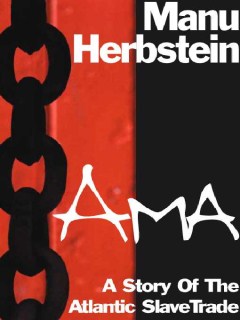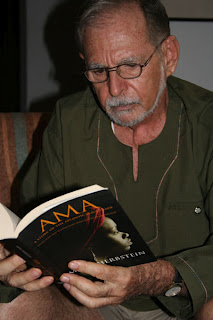
THE BOOK: IN THE BEGINNING...
CHAPTER 1
There was a puff of dust on the horizon.
|  |  |
A frequently asked question
How did I start writing "Ama"?
In 1994 in northern Ghana, gangsof young Konkomba men were rampaging through Dagomba villages, killing and burning. No one could explain their behaviour to me.
"Oh, the northerners, they are like that," I was told.
I felt ashamed of my own ignorance. In a libraryI found David Tait's book "The Konkomba of Northern Ghana." The story it told suggested to me that the roots of the violence might lie deeply embedded in past history. The Konkomba were here first, living without kings or chiefs, ruled by elders and priests. The Dagomba, originally from Lake Chad, arrived on their horses, conquered the natives and took their land (that's really potted history for you). Asante conquered the Dagomba about 1773 and exacted an annual tribute of slaves. Every year Dagomba warriors set out to hunt for Konkomba to deliver to Kumase.
I asked myself what it must have been like to be a Konkomba girl, so captured. I read everything relevant that I could lay hands on in Accra, much of it published before 1970. As I did so, I created Ama, and she wrote the book for me.
"Ama" is an important book (even if I say so myself.) It tells a story that needs to be told and has hardly ever been
told before. It fills in some of the gaps upon which historians are only permitted to speculate. Even if it were badly written it should merit publication. (So much rubbish rolls off the western presses every day.) Yet no U.S. publisher would touch it. Only the revolution in the publishing industry and the commitment and dedication of my former agent, Richard Curtis, now my publisher (http://ereads.com), has made it possible for the book to reach the audience which I hope is waiting for it.
In April 2002, "Ama" received the 2002 Commonwealth Writers Best First Book Prize. Later it was published in a Picador Africa print edition.
Manu
Brutal scars of slavery: Author Manu Herbstein chats to Bruce Dennill about his powerful, award-winning novel, Ama
From The Citizen, Johannesburg, Saturday February 18, 2006
Ama is a vibrant, often brutal book, richly redolent of the ancient territories from which its characters are drawn. The man introduced as its author is a slight, bespectacled man with greying hair and a well-trimmed beard. It doesn't add up.
Manu Herbstein was born in South Africa, but has spent much of his life travelling to and living in distant countries. He eventually settled in Ghana, where his wife (a Ghanaian) runs a factory and has interests in real estate.
Was she an inspiration for Ama, who suffered so much and yet remained unbowed?
He laughs: "No " she kept asking me why I was concentrating on the past, when we have so many problems now."
Herbstein suggests that it may be his South African background that led him to write of the hardships of black Africans suffering abuse at the hands of Europeans.
OPENING READERS EYES
The book deals with aspects of West African history that not many Western readers will be aware of, among them the hierarchy existing between the different nations in the region and the way local leaders co-operated with the European traders to sell their own countrymen into slavery.
"You must remember that, at the time, the local people didn't think of themselves as "Africans"," explains Herbstein.
"That was a construct Westerners placed on them - then, they were nations trying to survive in the same area as other nations."
Has that changed much?
He pauses: "Colonialism destroyed the interactions between the nations. The old cultures still exist, though."
FINDING A HOME FOR AMA
Getting Ama published was an epic journey for Herbstein. No one deemed the book "right for their market".
In hindsight, he sees the funny side. "I had all these people calling me a writer, but I wasn&apos t- I hadn't been published yet," he says.
"I went to New York, where my son was going to university. I tore the "Literary Agents" page out of the Yellow Pages, and came across a name that could only be Ghanaian. They were helpful, although they wanted the manuscript cut by half and another character to be the main focus.
"Back in Ghana, I bought an out-of-date book on publishing from a street trader. I learned a lot, so I checked on Amazon to see if there was an updated version by the same author. There was, but when I got it, it turned out to be the same thing with a new title. I phoned the guy to complain, and it turned out he was a literary agent.
"We chatted about Ama and he said "Send me the manuscript."
That agent attempted to auction the book, but was met with a stream of rejections. He then decided to make it his first project in an online publishing venture. As it gained popularity, he began to print it on demand, and that made it eligible for submission for the Commonwealth Writers Prize.
A REWARD FOR PERSISTENCE
"The venue for the prize-giving ceremony in 2001 was Accra, in Ghana," Herbstein remembers.
"I was invited to the dinner and was chatting about all the authors and their work. My book wasn't there, though. The publisher had forgotten to submit it!"
Fortunately, by the time the next year's ceremony, in Edinburgh, rolled around, Ama was on the list.
Herbstein is animated - turns out he's a bit of a literary groupie: "I had breakfast with Louis de Bernieres [(Captain Corelli's Mandolin)] there," he gushes.
"The ceremony was at Holyrood Palace, and the prizes were to be presented by Princess Anne. She started talking to one of my competitors, but I couldn't understand her. It took a few sentences before I could make out that she was speaking English."
Herbstein found out that he had won the night before the ceremony, when he arrived back at his hotel room, after one too many " I had to dip my head in the basin - and found an envelope on the carpet."
He was awarded the 2002 Commonwealth Best First Book prize. Bizarrely, it still took until the end of 2004 before Pan Macmillan picked it up...
TRUTH VS FICTION
Ama contains several scenes of horrifying barbarity, including several rape scenes. Was it necessary to include these scenes? Were they just there to add impact?
Herbstein is solemn. "I didn&pos;t invent them. They're all embellished from real accounts - it's there in history."
It's difficult to know if the scars left by slavery will ever be eradicated. Herbstein tells of African-Americans, descendants of slaves, who go back to Ghana expecting to be treated as returning heroes.
He shakes his head. "To the locals, they're just tourists. With dollars."

